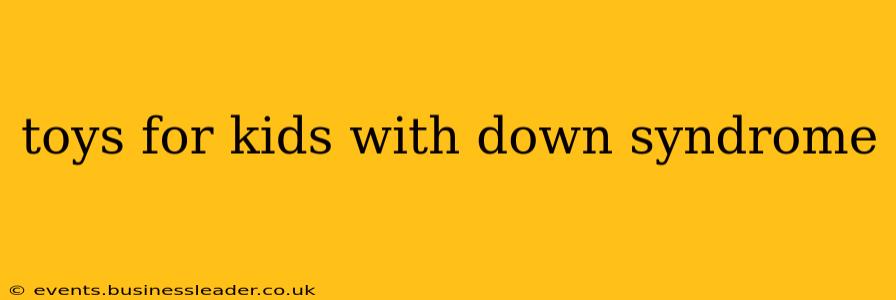Choosing the right toys for a child with Down Syndrome is crucial for their development and overall well-being. While every child is unique, understanding their developmental milestones and choosing toys that cater to their specific needs and interests can significantly impact their learning and enjoyment. This guide explores various toy categories, considerations, and answers frequently asked questions to help you select the perfect playthings for your child.
What Makes a Toy Suitable for a Child with Down Syndrome?
The key is to select toys that are engaging, stimulating, and appropriate for the child's developmental stage, not their diagnosis. Many children with Down Syndrome may experience delays in certain developmental areas, like speech or motor skills. Toys should, therefore, encourage the development of these skills in a fun and accessible way. Think about textures, sounds, colors, and the level of interaction required.
What are the Best Types of Toys for Kids with Down Syndrome?
Several toy categories prove particularly beneficial for children with Down Syndrome. These include:
Sensory Toys:
These are crucial for engaging a child's senses and stimulating their development. Examples include:
- Textured balls: Different textures stimulate tactile exploration and improve fine motor skills.
- Musical instruments: Simple instruments like shakers, drums, or xylophones encourage rhythm and coordination.
- Light-up toys: These capture attention and can help with visual tracking.
- Water play toys: The sensory experience of water is often calming and enjoyable.
Motor Skill Development Toys:
Toys that encourage gross and fine motor skills are essential for improving physical coordination. Examples include:
- Large building blocks: These encourage spatial reasoning and hand-eye coordination.
- Push and pull toys: These help develop leg strength and balance.
- Stacking toys: These improve hand-eye coordination and problem-solving skills.
- Play-Doh or clay: These encourage hand manipulation and creativity.
Cognitive Development Toys:
These toys focus on developing cognitive skills like problem-solving and critical thinking. Examples include:
- Simple puzzles: Start with large, chunky pieces and gradually increase complexity.
- Matching games: These improve memory and recognition skills.
- Shape sorters: These help children understand shapes and spatial relationships.
- Picture books with simple stories: These enhance language development and comprehension.
Social and Emotional Development Toys:
Toys that encourage social interaction and emotional expression are also valuable. Examples include:
- Dolls or stuffed animals: These encourage nurturing behaviors and imaginative play.
- Pretend play toys: These help develop social skills and communication.
- Interactive games: These encourage turn-taking and cooperation.
What should I avoid when choosing toys for my child with Down Syndrome?
While most toys can be adapted, it’s important to be mindful of certain features:
- Overly complicated toys: Choose toys with clear instructions and straightforward mechanisms.
- Toys with small parts: These pose a choking hazard.
- Toys that are too frustrating: The child should be able to succeed with the toy to build confidence.
- Toys that are beyond their developmental capabilities: Start with simple toys and progress as skills improve.
How can I adapt toys to better suit my child’s needs?
Many seemingly unsuitable toys can be easily adapted. For example:
- Simplify instructions: Break down complex tasks into smaller, manageable steps.
- Modify the rules of a game: Adjust the rules to make the game more achievable.
- Provide visual aids: Use pictures or symbols to help the child understand the game.
- Offer physical support: Provide guidance and support when needed, gradually decreasing assistance as the child’s skills improve.
Are there specific brands or types of toys that are better for children with Down syndrome?
There isn't a specific brand solely designed for children with Down Syndrome. The best approach is to focus on the toy's features and suitability for your child's developmental stage and interests, not its origin. Look for toys that are durable, safe, and engaging.
How do I know if a toy is age-appropriate for my child with Down Syndrome?
While developmental milestones might vary, general age guidelines are still a useful starting point. However, focus on the child's individual abilities and adapt the toys and play accordingly. If a toy seems too advanced, simplify it; if it's too easy, move on to a slightly more challenging one. Observe your child's engagement and adjust as needed.
Remember, play is essential for all children, and selecting the right toys can make a significant difference in a child's development, self-esteem, and overall well-being. Focus on creating a fun and engaging play environment that fosters learning and growth. Regular interaction and encouragement are equally important in supporting your child’s progress.
